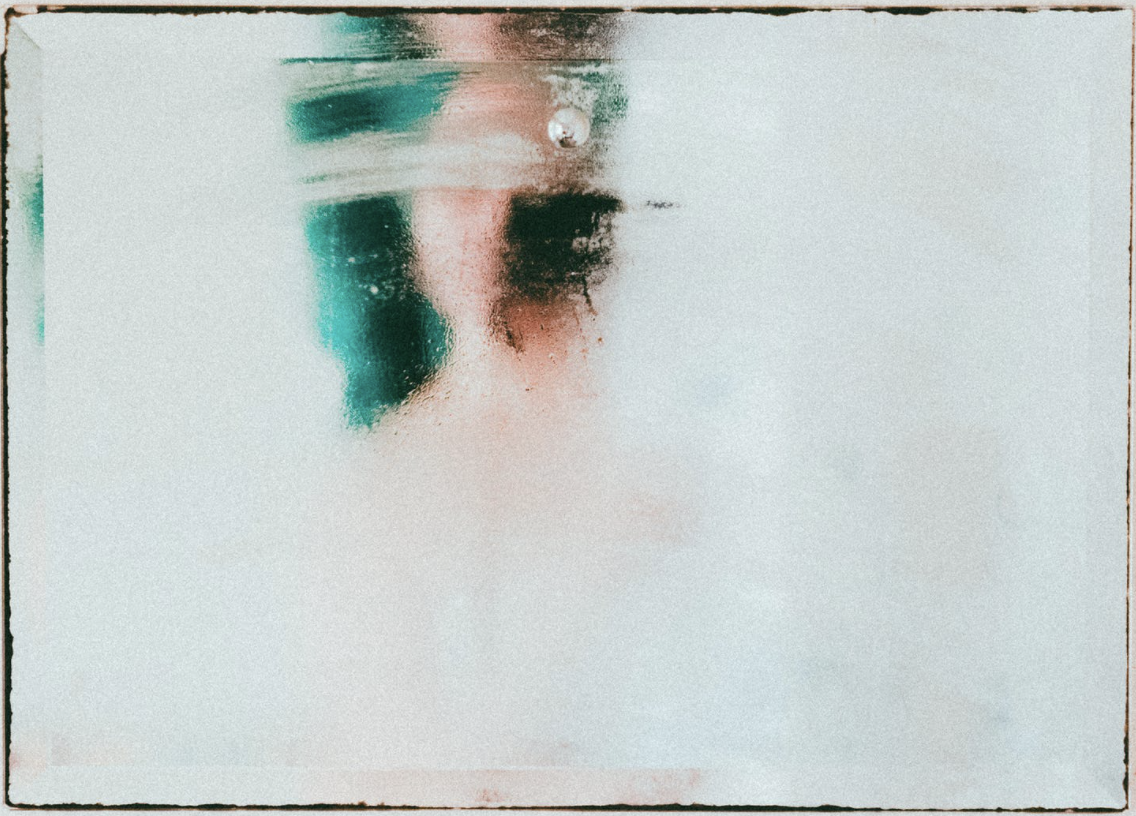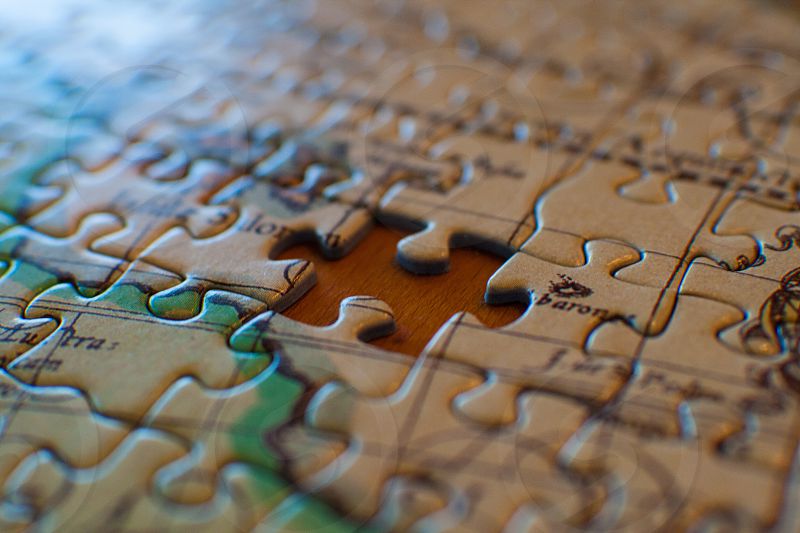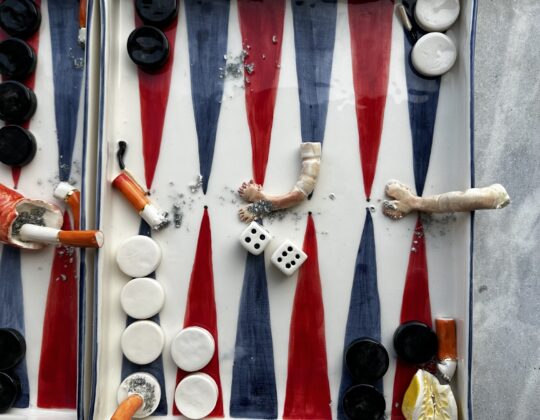I first saw Ina’s artworks on Instagram and I was immediately drawn to them. They are very raw and honest but truly powerful at the same time. Which leaves you no choice but to be touched deeply.
For the following I asked Ina if she wants to do an interview with me:
Luna Maluna Gri: Tell me a bit about yourself and your work.
How and why did start painting? What role does painting play for you?
Ina Fasching: I’m trying to combine the first three questions here a bit.
I have always been drawing and painting and it stayed with me my whole life. I didn’t know that it’s possible to study art until later. That I applied to study art at the Academy of Fine Arts (in Vienna) was a bit of a coincidence and that pushed me into doing painting. Before that I studied style design in England and there drawing was taught very exhaustive and through that, I got more and more into drawing and printing. I didn’t really like that though because it was very precise. I then also did a lot of illustrations and for me the question then always was; “Okay, what am I doing?”, I don’t really fit into any of that because the graphics are too plain for me, for illustrations I am too bold and then someone said to me: “Why don’t you study art?”, and that’s how I slid into that.
And from that point on when I was admitted into the Academy, my whole life was fulfilled. And I then had a real job. Well, I realized that this is not a study but the job I have and want to do. I, of course, on the side worked as a waitress, did babysitting, and sold mattresses but I realized that I like to work to be able to then work as an artist. And over time it developed at the Academy that I got into a gallery pretty early, so I got access pretty early into all of that and also was understood pretty early by my professor at that time, Gunter Damisch. He was a great teacher but sadly is already deceased. He was my teacher for three years and was in a way my mentor, he introduced me to art. After he died I got practically very independent and got even farther away from printed graphics and even more into painting and finished my studies at Daniel Richter two years ago. On the side, I already established my own atelier, sold artworks of mine, and am now able to make a living from it.

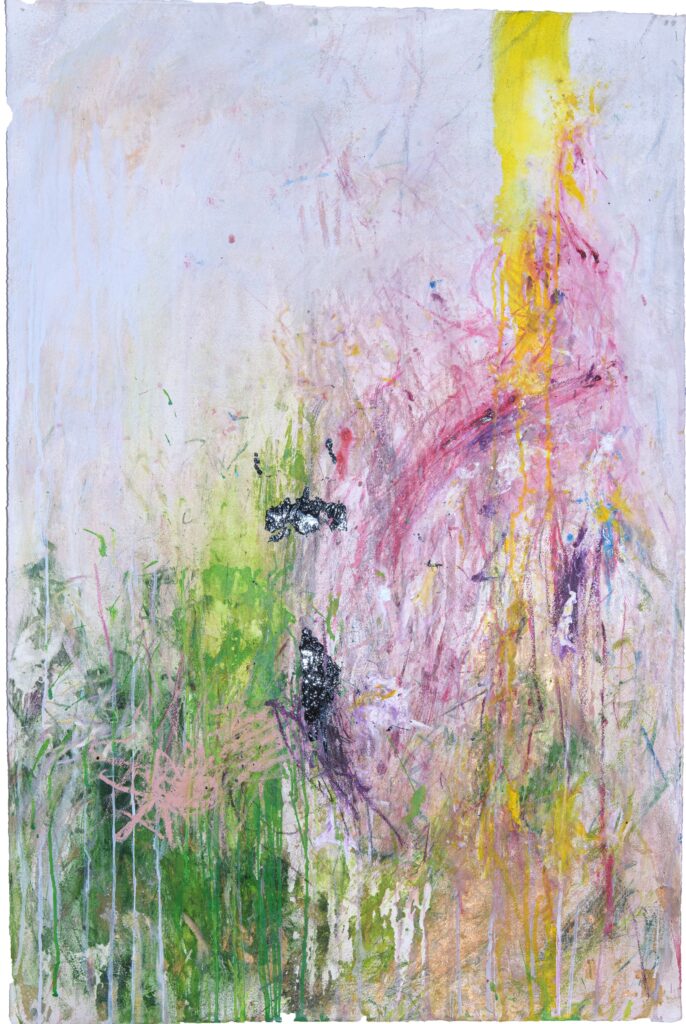
LMG: Is there something you want to change about the art world? If yes, what and why?
IF: The whole art world is so big, that that’s a difficult question to answer. In my art world, I would like to change that there is so much competition and rivalry. My art world is of course in a very small bubble, I’m glad that I’m not well-esteemed internationally and am now established in the rather smaller art scene in Vienna, but even there I notice that there is a lot of competition and few cohesion, especially between peers, and that’s really a pity. I think that would be the only thing where I would say: “Hey, that’s something we could get rid of!”.
LMG: What do you think is/are the role/-s of artists and art in our society?
IF: I think it’s important to not overestimate the role of artists because we are doing our job like everyone else, we just don’t get paid for it like everyone else, I’m saying “everyone else” now in quotes, but I think it is important that there are artists. That is also education just as Maths or German for example and especially in schools that’s forced into a corner. Because I also work with children, I’m not a classical teacher but I teach art at a private school and there come children to our school which are actually highly talented, and even there you notice that all that falls within the scope of art is put into this mental box and everything has to be perfect and I think it’s so important to convey to the people that art can be anything and doesn’t have to be anything.
A lot of people do have a gateway to art. Some may find it through artworks in a museum but at the same time for others those artworks are also completely incomprehensible and that’s okay too, that should be respected too. I think though, that also always comes down to the different art movements how well you are able to show that, or how much it affects you. I also think political art is important. On that, I’m just able to lean on a bit, watch it and be interested but I think I’m not working enough in that field.
LMG: What does your creating process look like?
IF: My creating process is that I’m almost every day in my studio, that’s my daily routine, I’m always trying to set new tasks for myself. Due to that I’m painting relatively fast and producing a lot, I get bored very easily. In the past, I focused a lot on people and their stories and beings and animals and their characters, which was probably also a reprocessing of my own personality. By now I can’t do that anymore because I realized that that’s too much to take on and to catalyze through myself. Then I, especially after I finished my studies, concentrated more on the abstract, although it was still object-like but with a bigger range.
So that means that I set a task for myself, for example, I go for a walk in nature and try to memorize things that interest me with my photographic memory and go into my studio with a sketch of it in my head and then try to further develop that until I get bored. When I then get bored I have to look for something new again. That’s the process, also with materials, I always try new things. I also mix my own colours. That’s also something that’s important for me, to know “What’s the ground?”, “With what do I paint on that ground?”, so that all of that is well-rounded.
LMG: What inspires you?
IF: I really have to search for my inspiration. In the past that was a bit easier, I went about that more childlike. But, of course, when you are working on it every day and times like these also make it not easier, since inspiration is not just coming knocking on your door.
I think it always comes in everyday things, that could be old letters, it can be my dog, it can be anything, that I’m hearing a song and think: “Wow, those lyrics are interesting”, or as I said, nature and so on.
LMG: So, inspired by life
IF: Yes inspired by life (laughs). Or to be more precise, that already is a safe haven for me where I want to leave life or my life, that’s what’s outside, outside and to create a new world for me inside. So I make the world into what I like it to be, a bit in that direction (laughs).

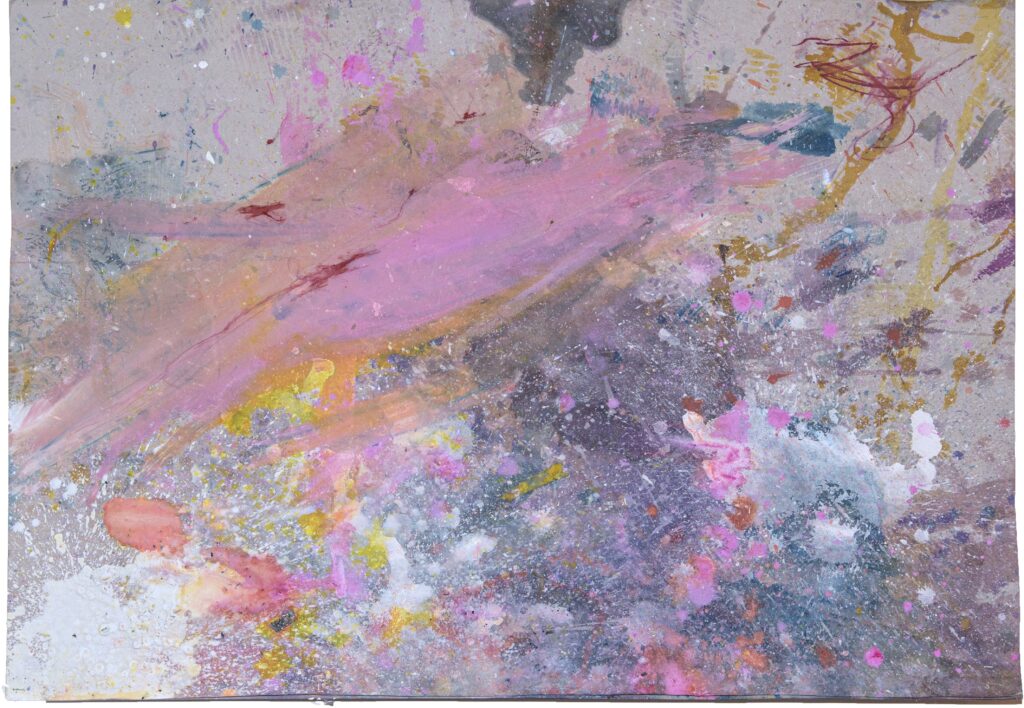
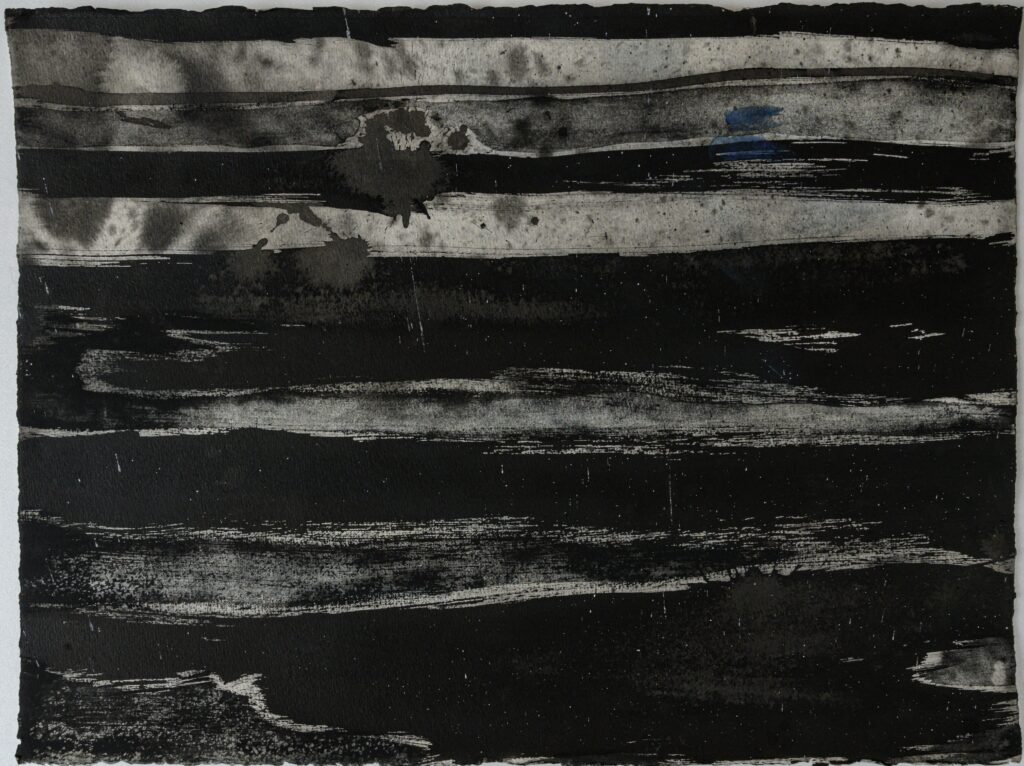
LMG: What artist/artists would you like to meet (dead or alive) and if you had one question what would you ask them?
IF: I thought about that a lot, there are of course a lot I would like to meet; I think I would like to meet Gunter Damisch again. Because he passed away so early and I would ask him if he wouldn’t want to stay a bit longer?
LMG: Aw beautiful.
IF: Yess. That really is a matter of the heart. He was an important artist and person who really was talented. He was 63 when he died and when I was younger I had not really a connection to his artworks, but now that’s different of course. So, if that would be possible to bring him here again that would be really nice.
LMG: What does a normal creating day look like for you?
IF: I wake up and then I take care of myself, then of my dog, then I go for a walk with her and then I usually have to clean or something because I’m a bit chaotic and I still want it to be clean and then around 1 or 2 p.m., when everything is finished, also at the computer, all the E-Mails and stuff, I go down to the studio and then I start working on my pieces. When I get into it, I have my peak around 4, and then I work until 7, half past 7 or 8, depending on how I’m feeling that day, and then I close the studio and that’s how normally my days go.
LMG: What is something you can’t create without?
IF: I think I wouldn’t be able to work if I had no quiet, that’s really important. I also wouldn’t be able to work if I wouldn’t be at peace with myself. If I’m bustling about that doesn’t work, I have to be grounded. I wouldn’t be able to work if I’m not in a good mood. If I’m in a really bad mood I’m not going to the studio, that makes no sense. And of course, I also couldn’t work without colours and paper (laughs). That’s easier for performance artists in that regard. They need an audience though.
LMG: Is there something you want to achieve in your art life? Dreams? Future plans? Or projects you would like to do?
IF: One dream is, of course, a bigger studio, ideally, with a garden, a charming little house beside that would be nice, where you are able to be more of a free spirit than in the city. Additionally, I would keep the studio in the city. That would be the first dream, which is pretty materialistic, but I think it will happen. And to be able to make a living from my art, to make a really good living, is of course really great, to be able to say that you don’t always have to stress about money.
What is also really beautiful, and what I also notice now, is that I get a lot of praise from open-hearted people and that the people who buy my artworks are often very humane. And I also wish that I stay grounded and don’t let everything get to my head.
LMG: What was the reason for you to become an artist (if there is a specific one)?
IF: The reason to become an artist was that I never fit anywhere, it was very hard for me at school, not in the sense that the subjects were hard for me but that I was always thinking a bit different than “how it’s supposed to be” or how it was expected. A lot of ways were blocked for me because of the Matura (= High School Certificate in Austria), I got a 5 there for Art (grades in Austria are from 1(best) to 5(worst) ). After that, I stopped doing art and anything creative, there was a short pause there.
After I finished my studies in England I wanted to move in with my boyfriend at that time, back to Vorarlberg. We bought an apartment there and were driving back there from Vienna and at there I was realizing “Uhh, okay, that won’t work, I can’t do that, that’s not me, I can’t fit into all of that and I especially don’t want to go back to Vorarlberg and live that stereotypical life with children, etc…. And at that moment, on the freeway, I said to him: “Please stop, I will apply at the Academy of Fine Arts and I’m not able to take that apartment, that’s just not possible.”
Meanwhile, that apartment belongs to my parents, they were really angry at me when they heard that, you can imagine, but that was the right decision. And in retrospect, I really think that there is a certain job inherent for everyone and that I was very lucky that I’m able to go my own way and that I found it. So, someone really meant well for me (smiles).
LMG: Amazing. Also, that you found it despite everything.
IF: Yes! The path is of course not always easy. If I had to work now at some graphics office, I would have ended up depressed and really had gotten problems with myself. The thing is, I’m a highly sensitive person and I’m not able to cope with my surrounding world, or very rarely, and that I would have been put into normal working life, wouldn’t have worked.
Copyright to all artworks and photos: Ina Fasching
Instagram: https://www.instagram.com/faschingina/
Website: https://www.inafasching.com




